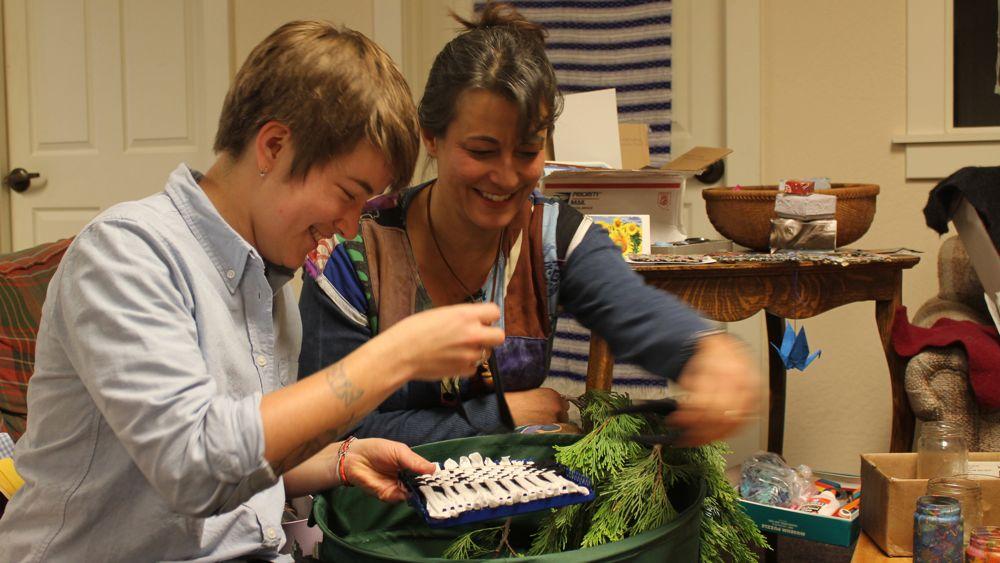
Paula Sohl and Lacey Hunter of the First Congregational Church of Christ, in Ashland, Ore. Like many residents in the Northwest, Sole and Hunter are concerned about their consumption habits. They've organized an event called "Occupy Christmas."
MEDFORD, Ore. -- A majority of residents of the Northwest say the threat of climate change requires us to rethink our way of life and consider driving and consuming less.
New data from a poll commissioned by EarthFix reveals a majority of Northwest residents also believe consuming less and making lifestyle changes is the best way to address the economy. David Hibbitts & Midghall (DHM Research) of Portland conducted a survey of 1,200 people in Washington, Oregon and Idaho.
The EarthFix Poll
- Check out at the complete findings from a scientifically representative survey for EarthFix by DHM Research.
- Take the survey: Answer some of the same questions that were put to 1,200 fellow Northwesterners and see how your answers compare.
- Read our earlier reports on the EarthFix Poll results: how Idaho residents feel about the Boise River and how Northwesterners prioritize water quality but not their own role in degrading it.
Respondents in Washington were most concerned about climate change. Sixty-five percent of them agreed it requires us to change our way of life, compared to 60 percent in Oregon and 50 percent in Idaho.
Emissions studies support the notion that changing consumption habits will be key to reducing the contribution the Northwest makes to global carbon emissions.
But the holidays can make it hard to abide by that goal to change habits and consume less. On a recent weekend, J.P Dupois and his son Eddie waited in the cold to talk to Santa Claus on a corner in downtown Medford. Eddie is hoping to get a Skylanders video game and figurines for Christmas.
Graphics by Heidi Nielson/Good Works Design
"A lot of it's about planned obsolescence. You have a video game, for example. What's going to happen in three years? The thing's going to be out of date. They're not going to provide support," Dupois said.
He's concerned about the difficulty of recycling video games. But that's probably not enough to stop him from buying them.
"Those are concerns. But they're not foremost in my son's mind. All I hear is, 'I want, I want, I want, I want,'" said Dupois.
The Economy and the Environment
Northwest residents consider the environment protection to be an important consideration. Asked to choose between two statements that come closest to their point of view on the economy and the environment:
38 percent chose the statement, "Protection of the environment should be given more priority even at the risk of slowing economic growth."
19 percent agreed with the statement, "Economic growth should be given priority, even if the environment suffers to some extent."
41 percent chose neither statement or said they don't know.
Oregon recently commissioned a study of the greenhouse gas emissions that result from the total consumption by residents in the state. The study found three categories of consumption responsible for about 50 percent of greenhouse gas emissions: personal vehicles, appliances, and food and beverages.
David Allaway is with the Oregon Department of Environmental Quality. He says the carbon footprint of all the little purchases we make is significant. But aside from cars and large appliances it's difficult for a consumer to evaluate the carbon emissions impact of any single purchase.
Graphic by Heidi Nielson/Good Works Design
"For most products, life-cycle analysis have not been performed, and where they have been performed, they're not available to the public," Allaway says.
He does have a few general rules for holiday shoppers who are trying to minimize their carbon footprint.
"Look for durability, quality, longevity," he says. "Buy products that aren't quickly going to go out of style."
And there's a big distinction between buying material goods or products and buying services. Allaway says services -- from museum memberships to Timbers tickets to a pedicure -- can make a good low-emissions holiday gift.
Low Emissions Gift Guide
- Check efficiency of appliances and cars
- Look for quality products that will last
- Services- tickets, membership, charity- are low emissions
- Try second hand shops or recycled gifts.
"These services, broadly speaking, have greenhouse gas emissions per dollar that are considerably less than most forms of products or materials you could go to the store and buy."
Re-using and recycling gifts also helps minimize your impact as a consumer. At the
First Congregational United Church of Christ
in Ashland, Oregon Paula Sohl and Lacey Hunter are collecting old t-shirts and magazines, and inviting people to spend Saturdays making crafts. They're calling themselves "
."
Sohl says she's hoping to encourage people to share what they already own, instead of buying more. It's a popular concept in Ashland, which is also home to an annual "Abundance swap."
"We've been making handmade paper, using old calendars to make boxes and oragami, gathering together fabric scraps for quilts," she says.
"It takes time to change habits, and find greener ways of living. It's a balance, because I do live in this century, but I'm also reviewing the choices I make every day."